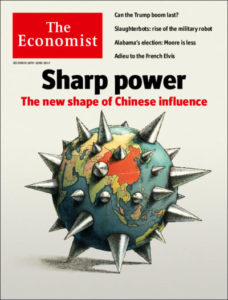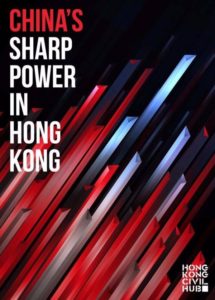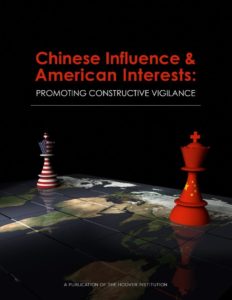 China’s media is being wielded as a tool to shape public opinion and serve the ideological aims of the Chinese Communist Party (CCP) across the globe. And, as a part of its efforts, Beijing is training up foreign journalists, buying up space in overseas media, and expanding its state-owned networks on an unprecedented scale, Australia’s ABC News reports in a must-read survey:
China’s media is being wielded as a tool to shape public opinion and serve the ideological aims of the Chinese Communist Party (CCP) across the globe. And, as a part of its efforts, Beijing is training up foreign journalists, buying up space in overseas media, and expanding its state-owned networks on an unprecedented scale, Australia’s ABC News reports in a must-read survey:
The CCP’s aspiration has grown beyond just controlling news domestically — where many Western media outlets, including the ABC, are now blocked in one of the most restrictive media environments in the world — it now wants to create a “new world media order” beyond its borders…. Meanwhile, a five month investigation published in The Guardian in December revealed the “astonishing scope and ambition” of China’s world-wide propaganda campaign over the past decade….According to a report released by the Pentagon this month, Xinhua launched 40 new foreign bureaus between 2009 and 2011 alone. That number jumped to 162 in 2017 and it aims to have 200 by 2020.
 Repudiating the West’s “one way only” democratic liberalism, Beijing championed the Confucian “many ways” multilateralism, defending nations’ prerogative to chart diverse ideological progress, argues Peter T. C. Chang, a senior lecturer at the University of Malaya’s Institute of China Studies. The China model, Beijing assured, is unique and will not be replicated elsewhere, he writes for the South China Morning Post:
Repudiating the West’s “one way only” democratic liberalism, Beijing championed the Confucian “many ways” multilateralism, defending nations’ prerogative to chart diverse ideological progress, argues Peter T. C. Chang, a senior lecturer at the University of Malaya’s Institute of China Studies. The China model, Beijing assured, is unique and will not be replicated elsewhere, he writes for the South China Morning Post:
Earnest in intent, China’s campaign to forge an alternative, pluralistic world order is nonetheless facing a hard sell. State suppression of dissent, and a violent clampdown in restive Xinjiang, among others, have tarnished China’s image abroad and eroded confidence in Beijing’s credibility to assume global leadership.
The Beijing Olympics paved the way for the Uighur camps. The 2008 games were supposed to help liberalize China, but the party learned it could get away with anything, analyst Nithin Coca writes for Foreign Policy.
 But talk of a new ideological Cold War is overblown, argues Joshua Shifrinson (@shifrinson), an assistant professor of international relations at Boston University and the author of “Rising Titans, Falling Giants: How Great Powers Exploit Power Shifts” (Cornell University Press, 2018).
But talk of a new ideological Cold War is overblown, argues Joshua Shifrinson (@shifrinson), an assistant professor of international relations at Boston University and the author of “Rising Titans, Falling Giants: How Great Powers Exploit Power Shifts” (Cornell University Press, 2018).
The respective “ideologies” of the United States and China do not favor this type of contest today. Indeed, analysts calling for a hard-line stance against China have faced difficulties even identifying a coherent Chinese ideological alternative, he writes for the Post’s Monkey Cage blog:
And while some researchers claim that a nascent ideological contest pitting an “autocratic” China against the “liberal” United States is emerging, this narrative ignores the political contests that shape Chinese politics (and have parallels in U.S. politics). Autocracies and democracies often cooperate. And on one important ideological issue — how they organize their economic lives — China and the United States have both embraced economic growth via trade, the private sector and semi-free markets.
Likewise, while a clearer Chinese ideological “brand” may eventually emerge, it is unclear whether the ideology would claim universal applicability, Shifrinson adds.
Nevertheless, “China is leveraging military modernization, influence operations, and predatory economics to coerce neighboring countries,” analysts attest.
 While the Communist Party of China remains fixated on hiding and rewriting the past, ordinary Chinese are determined to write the country’s future, notes Minxin Pei, a professor of government at Claremont McKenna College and the author of China’s Crony Capitalism.
While the Communist Party of China remains fixated on hiding and rewriting the past, ordinary Chinese are determined to write the country’s future, notes Minxin Pei, a professor of government at Claremont McKenna College and the author of China’s Crony Capitalism.
Shortly after China’s strongman president, Xi Jinping, came to power in late 2012, the Communist Party of China circulated its now-infamous “Document No. 9,” banning seven topics from public discourse. In addition to the obvious – constitutional democracy, civil society, individual rights – the CPC forbade any speech or writing that might fall into the category of “historical nihilism,” he writes for Project Syndicate.
As a casual reading of the document makes clear, Xi and his lieutenants were worried that a truthful accounting of the events that have shaped contemporary China would expose the CPC’s own lies. “Historical nihilism” thus captures any challenge to the party’s official historical narrative and mythology, adds Pei, a contributor to the NED’s Journal of Democracy, in a review of Weijian Shan’s Out of the Gobi: My Story of China and America and Karoline Kan’s Under Red Skies: Three Generations of Life, Loss, and Hope in China.
With a less robust media environment and countless cash-strapped local networks, China has been more active in infiltrating and controlling African media, ABC News adds:
 China has also been active in influencing the reporting of local media. In just one example, Beijing offered financial and logistical assistance to extend the FM range of Zambia’s public broadcaster. Ostensibly, this was done to improve a public service, but independent analysis from the Centre for International Media Assistance later found bias for the ruling party in its content.
China has also been active in influencing the reporting of local media. In just one example, Beijing offered financial and logistical assistance to extend the FM range of Zambia’s public broadcaster. Ostensibly, this was done to improve a public service, but independent analysis from the Centre for International Media Assistance later found bias for the ruling party in its content.







